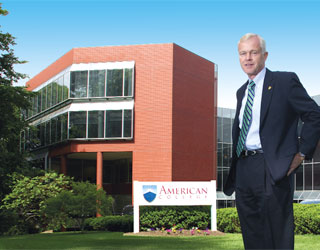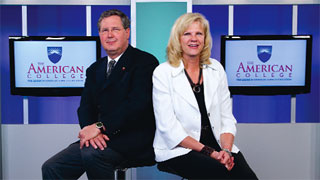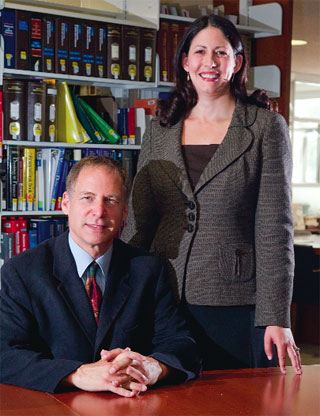|
Teaching to an evolving market
The American College introduces programs focusing on women, retirees, special needs families, and diversity
By Elisabeth Boone, CPCU
Anyone who attains the age of 83 is sure to have accumulated an impressive store of wisdom and experience. As most octogenarians will testify, however, those who have made it past the eight-decade mark tend to take things a bit slower than they did in their younger days.
That’s definitely not the case at The American College, the leading provider of educational services to financial planning professionals. Founded in 1927 by industry pioneer Solomon S. Huebner, The American College began its tradition of excellence with the Chartered Life Underwriter (CLU) program, which graduated 21 designees in 1928. Today almost 100,000 financial services professionals hold the respected designation, and another 47,000 have earned the prestigious Chartered Financial Consultant (ChFC) designation since the advanced financial planning program was launched in 1982.
The American College also is the leading provider of Certified Financial Planner (CFP) education, which prepares students for the comprehensive examination administered by the CFP Board of Standards, Inc. Other designation programs are the Life Underwriter Training Council Fellow (LUTCF), conferred jointly by The American College and the National Association of Insurance and Financial Advisors; Financial Services Specialist (FSS); Chartered Advisor for Senior Living (CASL); Chartered Advisor in Philanthropy (CAP); Registered Health Underwriter (RHU); Registered Employee Benefits Consultant (REBC); Chartered Leadership Fellow (CLF) for home office supervisors; and Chartered Leadership Fellow (CLF Field) for field leaders. The American College also offers two graduate degree programs: The Master of Science in Financial Services (MSFS) and the Master of Science in Management (MSM).
Thought leaders
It’s impossible to count the ways in which the financial services industry has changed since The American College opened its doors more than 80 years ago. Throughout its history, the institution has anticipated and responded to emerging trends and, equally important, has developed a faculty of distinguished thought leaders in financial services practice and management.
Serving as president and chief executive officer of The American College is Larry Barton, Ph.D., a noted educator, author, and crisis management expert, who has held the position since 2003. The financial services industry, he observes, is going through a period of enormous change, and The American College is adapting in a number of ways to meet the evolving needs of industry professionals.
“We were traditionally known as a bricks and mortar institution, and when we were established in 1927, we were devoted to the study of life insurance,” Barton explains. “Over the past 10 years we’ve been moving to a digital platform. Right now, about one-third of the agents who study with us are studying online, and we think that by the end of 2012 about 50% of our learning will be online. That’s a seismic shift for an institution like ours,” Barton remarks.
The reach of The American College is broad, he says. “About one-third of all the financial advisers in the country have studied with us, and our registrations last year were up 6%. That’s a significant increase when you consider that, over the past two years, roughly 200,000 jobs have been lost in the financial services industry, including mutual fund companies, insurance companies, agencies, and banks,” Barton notes.
“Many of these professionals are choosing to go back to school, and I think that’s a very encouraging sign,” Barton continues. “We have adapted by creating new learning platforms and hiring new faculty, and thanks to support from State Farm we now have the only full-time endowed chair in the country for women in financial services,” Barton says.
“Within the next year, in partnership with a large insurer, we hope to be able to open the first center for diversity in the financial planning profession,” he continues. “We recognize the need to prepare professionals to work with African Americans, Asian Americans, Latinos, the LGBT community (lesbian, gay, bisexual, and transgender), and other underserved groups. The College is committed to becoming relevant to multicultural America. I find it a very exciting place to work,” Barton says.
Value to P-C agents
The programs of The American College, Barton believes, offer significant advantages to property/casualty agents and brokers. “Today, property/casualty agents are in the ultimate squeeze play,” he comments. “Their product line is limited, and the companies they represent often find that their ability to charge adequate premiums is being constrained by insurance commissioners. We’ve seen some excellent companies suffer the impact of poor regulatory decisions.
“I hope that the agent who offers only P-C products will have an open mind and say, ‘Maybe this is the time to expand my franchise and sell disability products or long term care products. I could help my clients by offering retirement planning products and services,’” Barton says.
He says that the continued consolidation of property/casualty insurers and agencies “will create a shortage of knowledgeable professionals who understand risk and can provide solutions for protecting people’s families, homes, and businesses. We need to keep those people in the game; we need to keep them actively engaged with the profession,” Barton asserts.
“At The American College, we have programs like Financial Services Specialist, Registered Health Underwriter, and Registered Employee Benefits Consultant that can help P-C professionals acquire the knowledge they need to provide a broader array of products and services in their communities.”
Special needs designation
In line with its commitment to educate financial planning professionals about the needs of diverse populations, The American College is creating a new designation that focuses on the financial issues faced by those who are caring for a family member with a disability.
“For a number of years, we have been running a joint program with MassMutual that grants a certificate in special needs planning,” says Walter Woerheide, Ph.D., ChFC, dean and vice president of academic affairs at The American College. Woerheide is also professor of investments and holder of the Frank M. Engle Chair in Economic Security Research.
“Last year, MassMutual approached us with the idea of expanding this program into a designation and offered to underwrite some of the expenses associated with doing that,” Woerheide says. “We consulted some experts to find out what should be in a program leading to a designation in special needs financial planning. With their input, we identified three courses that we believe will prepare students to serve this market.”
In the first course, Woerheide explains, students will learn to define the differences among various types of disabilities and the medical and social issues involved in dealing with people who have a specific disability. “The second course addresses legal and tax issues, and the dominant topic is establishing a special needs trust to protect the family’s assets and to ensure that the individual with a disability receives ongoing care after the death of parents or other family members who are caregivers,” Woerheide says.
“The third course covers applications of knowledge gained in the first two courses and involves ‘going live’ in actual situations involving special needs families,” Woerheide continues. “Emotions tend to run high in these families, and traditional financial planning professionals often are not prepared to deal with this level of emotion. Our course helps students understand families’ emotions and respond constructively,” Woerheide says.
Women and financial planning
Over the past 40 years, as the role of women in society and business has grown exponentially, so has women’s need for financial planning services that are targeted to their specific situations: executive, business owner, single parent, to name a few.
To help financial planning professionals identify and address the diverse needs and concerns of women, in 2007 The American College was instrumental in creating the State Farm Chair in Women and Financial Services. As President Barton noted earlier, this is the first full-time endowed chair of its kind in the country.
The chair is currently held by Mary Quist-Newins, ChFC, CLU, CFP, who is assistant professor of women’s studies at The American College.
“The purpose of the chair is to be the nation’s leading authority on the issues and opportunities that women, as consumers and as financial services professionals, present to the industry,” Quist-Newins explains. “We’ll accomplish that in three ways. First, we want to be the thought leader in both primary and secondary research. We’ve already collected a comprehensive volume of data from industry, government, and academia. Our second objective is to elevate the awareness of women’s financial issues and concerns and the opportunities that they create for financial planning professionals and the companies they represent,” she says. “The third piece is education to build the skills and competencies needed to more effectively market to women, work with them, and plan for their financial security.”
Among the many reasons for financial planning professionals to understand and respond to the needs of women, Quist-Newins points to some compelling facts: “American women today hold over half the nation’s wealth, and affluent women are growing at twice the rate of affluent men. Women business owners are growing at two to three times the rate of male business owners. According to some estimates, by 2030, two-thirds of the nation’s wealth will be in the hands of women,” Quist-Newins comments.
What’s more, she says, “Research consistently shows that women are more predisposed to accept financial advice, and more likely to benefit from it, than men are. Women also face more life risks than men do. Putting all this together, it’s clear that women are a large, growing, and increasingly affluent market that is receptive to the services that financial planning professionals can deliver,” Quist-Newins asserts.
“Yet, according to LIMRA, just 16% of male producers intentionally market to women, and only 50% of female producers intentionally market to women. When you consider that men outnumber women five to one in this business, it’s obvious that women are vastly underserved,” she declares. “We see this as a huge opportunity that is largely untapped. The professionals who understand that and make it their business to market to women will be able to dominate their competitive space.”
Retirement income center
Another population that is experiencing rapid growth and whose financial planning needs are both diverse and complex is senior citizens. As a result of the recession and stock market collapse, workers can no longer be sure of a comfortable retirement, and many older Americans are working well past age 65 because they can’t afford to retire. Seniors face a daunting array of financial challenges: inexorably rising health care costs, cuts in Medicare funding, the prospect of requiring expensive long term care, and the very real possibility that they’ll outlive their savings and investments.
Thanks to a gift from New York Life, The American College was able to launch a new center of excellence. Established in 2007, the New York Life Center for Retirement Income educates financial services professionals about the issues and concerns of older Americans in retirement.
Serving as co-director of the Center is David Littell, JD, ChFC, CFP, who holds the Joseph E. Boettner Chair in Research and is professor of taxation at The American College.
“As people move into retirement, they need to think more about spending down their assets as opposed to accumulating wealth as they have done in their working years,” Littell says. “There’s a lot that financial advisers need to know about this issue, and The College wants to help these professionals use a holistic approach.
“For example, our concern is that an insurance agent might focus on annuity solutions, whereas an investment adviser might never think about using annuities,” he says. “Our idea is that financial planning professionals need to be educated about all the solutions.”
To help financial planning professionals prepare to meet the needs of older Americans, The American College offers the Chartered Advisor for Senior Living (CASL) designation, Littell says. The program consists of five college-level courses: Understanding the Older Client; Health and Long Term Care Financing for Seniors; Fundamentals of Estate Planning; Investments; and Financial Decisions for Retirement.
Property/casualty agents and brokers, Littell asserts, can expand their practice and provide a valuable service to their older clients by acquiring comprehensive knowledge of retirement income issues and solutions. Understandably, he says, P-C producers often resist the idea of venturing into what for them is unfamiliar territory. “What we’ve found is that once these producers become educated about the issues, they have more confidence in their ability to work effectively in the retirement planning arena.”
A question of ethics
The issue of ethics in finance has taken on new urgency since the collapse of Wall Street and revelations of actions that, if not outright illegal, were viewed by most Americans as immoral, arrogant, and greedy.
The Center for Ethics in Financial Services at The American College offers programs that help financial planning professionals become sensitive to ethical issues and think critically about ethical solutions.
“Ours is the only academic center that focuses specifically on ethics in the financial services industry,” says Julie Ann Ragatz, assistant professor of ethics and associate director of the Center for Ethics in Financial Services. “Our objective is to integrate ethics into every single course, and to do it in a way that feels natural and models how ethical issues will emerge for people as they practice their profession.”
The Center also offers Webcasts for continuing education credits for CFPs and for professionals who must satisfy state insurance department requirements. Another component of the Center’s mission is to provide outreach on key ethical issues by offering commentary on current events and their ethical ramifications.
Center for diversity
Ragatz is excited about plans to create a center for diversity at The American College, an initiative in which she will play a key role. “We know that, throughout the country, there are groups of people who are not representative of the demographics that make up the traditional market for financial planning services,” Ragatz says. “These are people we will need to serve in the future.”
The proposed diversity center, Ragatz says, will have three objectives. “First, we need to get our own house in order by ensuring that we are adhering to the highest principles of diversity and inclusiveness and sensitivity. When financial services professionals from diverse backgrounds open our textbooks, are they seeing their own stories reflected in the case studies? Are the professionals who work at major insurers learning how to meet the needs of diverse populations and people in nontraditional families?”
The second step, Ragatz says, “is to launch a campaign to show the industry and stakeholders like regulators, legislators, and the media that, while we all understand diversity concerns intellectually, the fact is that certain groups feel alienated from the financial services industry. When people don’t have access to financial services, there are damaging and permanent consequences for them and for us. We need to educate financial planning professionals about how to approach underserved groups in culturally sensitive ways.”
The third objective for the proposed diversity center, Ragatz says, is to bring together industry practitioners who are concerned about diversity issues so they can examine the challenges and explore solutions.
“Almost every financial services company has a diversity initiative,” Ragatz says. “We’re not confident that they’re talking to each other or sharing best practices. At The American College, we want our diversity center to create a space where people can share ideas, explore strategies, and develop best practices.”
Taking the lead
With its strong commitment to preparing financial planning professionals to understand and address a host of emerging market needs, and to behave according to the highest ethical standards, The American College continues to reflect the principles and values of its founder, Solomon Huebner. Were he alive today, Dr. Huebner might not recognize the 21st century face of the institution he established, but unquestionably he would be proud of its accomplishments and initiatives.
For more information:
The American College
Web site: www.TheAmericanCollege.edu |
|
| |
 |
| |
"We have programs that can help P-C professionals acquire the knowledge they need to provide a broader array of products and services in their communities."
—Larry Barton, Ph.D.
President and CEO
The American College
|
| |
 |
| |
“Our course helps students understand special needs families’ emotions and respond constructively.”
—Walt Woerheide, Ph.D., ChFC
Dean and Vice President of
Academic Affairs
The American College
|
| |
“American women represent a large, growing, and increasingly affluent market that is receptive to the services that financial planning professionals
can deliver.”
—Mary Quist-Newins, ChFC, CLU, CFP
Holder of the State Farm
Chair in Women and
Financial Services |
|
| |
 |
| |
“Once P-C producers become educated about the issues, they have more confidence in their ability to work effectively in the retirement planning arena.”
—David Littell, JD, ChFC, CFP
Co-Director
New York Life Center for Retirement Income
|
| |
“We need to educate financial planning professionals about how to approach underserved groups in culturally sensitive ways.”
—Julie Anne Ragatz
Associate Director
The American College
Center for Ethics in Financial Services |
| |
|